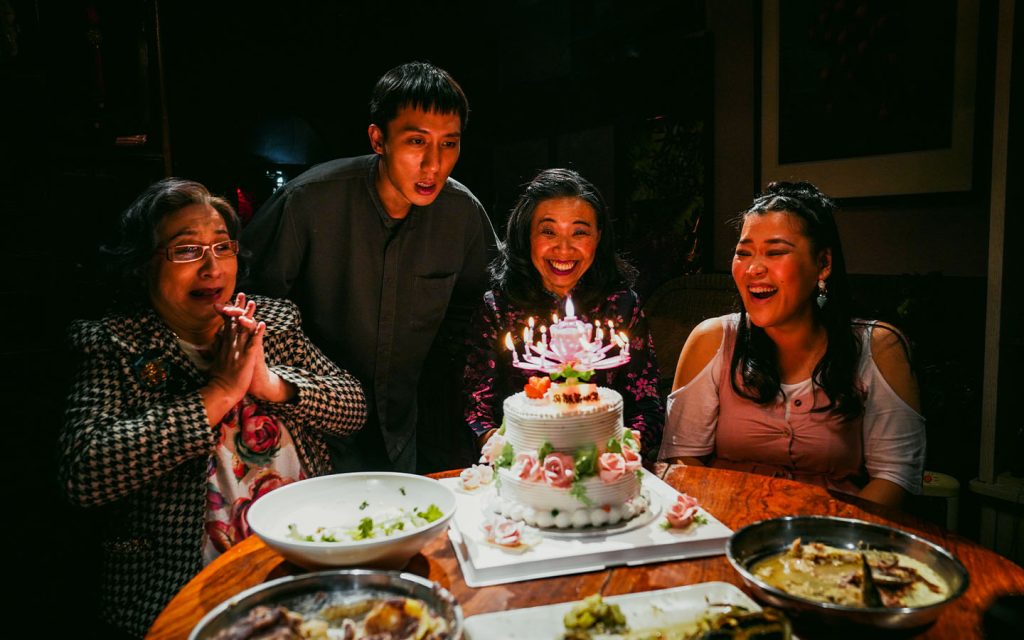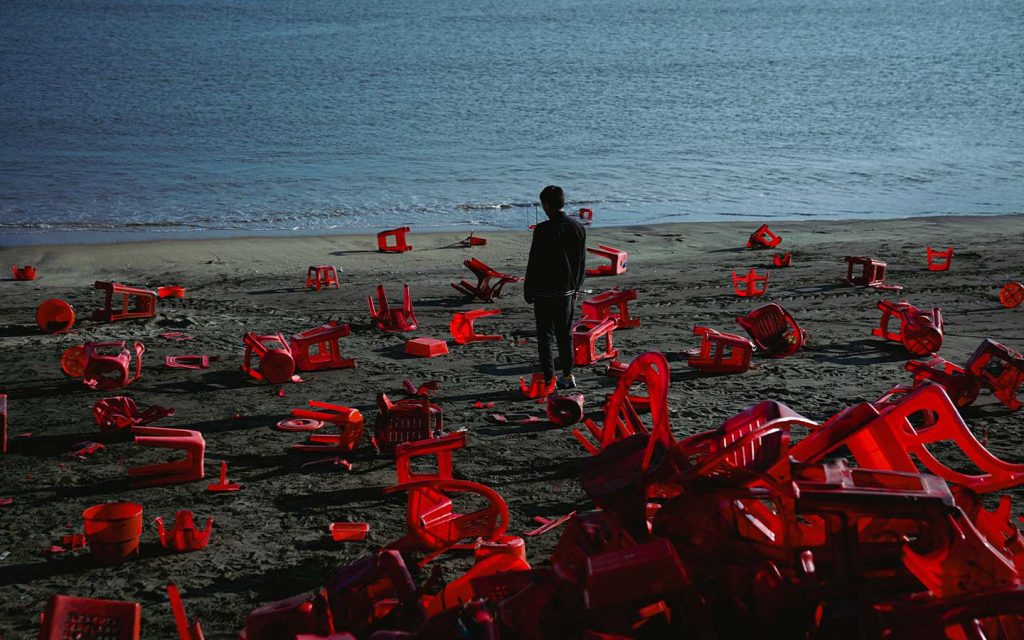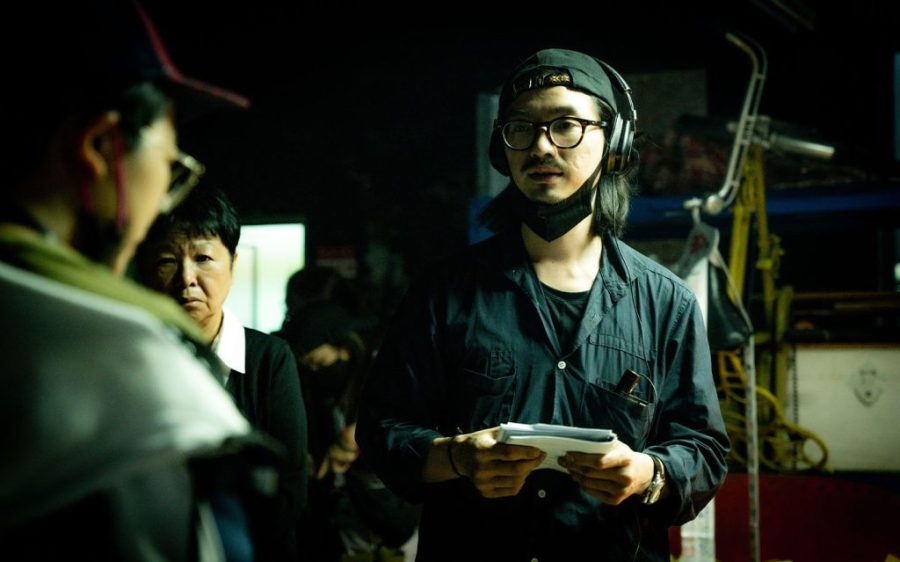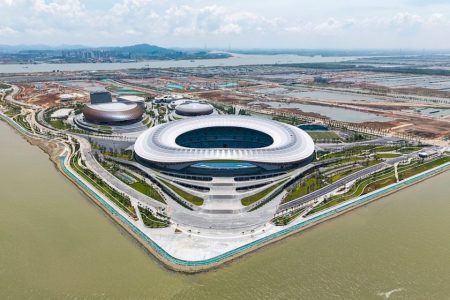A crazed mother exacts revenge on her estranged husband using a meat grinder, while her introverted son, who becomes disenchanted with his dysfunctional family and dreams of reincarnating as a red plastic stool, moves out of his family home and befriends a female real estate agent. She may or may not have been a man at some point in the past. These are the surreal characters from Macao director Mike Ao Ieong’s latest film, I Want to be a Plastic Chair (2023), the first locally produced full-length feature to be classified in Group D, which means that it’s for ages 18 and up only.
With a budget of 3 million patacas, I Want to be a Plastic Chair marks a significant milestone in Ao Ieong’s career as his debut full-length feature, having held its world premiere at the prestigious Taipei Golden Horse Film Festival last December. Prior to that, the 40-year-old directed smaller projects, worked as a cinematographer for other filmmakers and dabbled in photography. His cinematic talent was recognised in 2018 when he was awarded the Asian New Talent Award for Best Cinematographer at the Shanghai International Film Festival.
[See more: Acclaimed Macao feature film goes on local release]
Ironically, Ao Ieong did not originally set out to become a filmmaker. In fact, when he first entered Taiwan’s National Chung Hsing University, his major was entomology, the study of insects. It was only later on that his formal study began to converge with cinema, when he took up a four-year program in visual communication design at the National Yunlin University of Science and Technology between 2007 and 2010.
The young filmmaker sat down to talk about movies with Macao News after a screening of I Want to be a Plastic Chair at his favourite location in the city, Cinematheque Passion.
This interview has been translated from its original Cantonese, and has been edited for brevity and clarity.
How did you become a director?
The story of how I became a director is like this: one day I had this feeling that cinema would be a great choice for when you want to share your story with others. Of course, some people will pick literature, while others will select music, dance or poetry. You’ll suddenly feel a moment like on a thunderous night, when you’re instantly struck in the head by a bolt. You’ll have the feeling of wanting to make a film. It could be as pure as wanting to become a director or wanting to make a movie. You want to share your own specific feelings or story with others.
When did you begin to formally study filmmaking?
I don’t think I’ve been formally studying filmmaking. If I go to any place today or see this tree, they will actually be connected to films. Filmmaking originates from life. In fact, you are thinking about films all the time. Anything can become your source of inspiration. You mentioned studying films, but I think what needs to be studied is how to experience this world, people and nature. This will be your nourishment, becoming that important element you need to learn in filmmaking.
[See more: The Macau International Queer Film Festival returns]
What are your thoughts about filmmaking in Macao?
There is no industry when it comes to filmmaking in Macao. The question is, do audiences need to watch more Macao movies first or do we [local filmmakers] need to make more movies first [for Macao films to take off]? Everyone who makes movies [in Macao] is very pure. They disregard budget or rewards for their creative work. We want to make a movie in a very sound manner.
With a stable income [which local filmmakers lack], you can rent a house and repay your mortgage, but it’s difficult in Macao. Even so, I think more and more people are making [local] films. I think more and more people are participating in film production and there are more people returning from overseas or working in different places. I think Macao is a great place to absorb experience from different places. It’s also a good place for culture and professional filmmaking. Nobody has any baggage and people can pursue the direction they want when making a film.

Do you think that the Macao film sector suffers from the problem of brain drain?
Macao has a group of great film talents. They are very good in their professional filmmaking ability and experience. On the question of brain drain, I think we [the local filmmakers] should venture out more and not treat Macao as the only place where we can make films or work. We should collaborate more with people from different places and film different types of movies. Cinema is massive; don’t constrain yourself.
[See more: ‘Evil Does Not Exist’ bags top prize at the Asian Film Awards]
How can Macao filmmakers attract more investors for their projects?
I think what we can do is make sure everyone does each project well, achieving what we set out to do. People will then watch Macao films and decide on whether or not there is a unique quality to these films, as well as whether or not they are marketable or decent. We should first let people see us. There’s no need to focus on the financial aspect. We should do our best. I think in the future, in a decade or so, people will see for themselves what Macao films are like.
Would you say the Macao government plays a big role in supporting local films?
Of course. I was only able to acquire the startup capital to make this film because of the [government’s] Support Programme for the Production of Feature Films. We don’t have stars or an industry, so how can we find someone who will give us the money to make a Macao movie when nobody recognises them? The SAR government, the Cultural Development Fund, and the Cultural Affairs Bureau have helped out a lot.
[See more: Remembering Michael Rogge, the YouTuber who preserved old Macao through film]
Are there any directors and films that you really admire?
There are too many. I think all of them. I admire each director who can complete a full-length film and dutifully show it to an audience regardless of whether it’s good or bad. I think I can learn from each of the masters of cinema.
As an indie filmmaker, have you thought about taking on more mainstream, commercial film projects?
Actually, I don’t mind. The only change is the method you use to make films. Having money comes with its limitations, while not having money comes with its freedom. Having money also comes with its stresses. If you can go commercial, then why not? Being able to go commercial is a skill in itself. How can you reject it and say there are some things you’ll do and some things you won’t do? In the end, it comes down to the heart of your movie. This is the most important thing.
[See more: Want to fund your Macao film? Apply now]
What advice would you give to young people wanting to enter the film trade?
If you want to do it, then give it a try. If you find you can’t make a living out of the trade or really don’t like it, then you can call it quits. But don’t rob yourself of the opportunity to have a try. If you give yourself a chance, you’ll find out for yourself how enthusiastic you are or how determined you are. Those who permanently remain in the trade are not doing it purely out of enthusiasm or love, but are instead those who are able to persist on a permanent basis. What you attain is yours for the keeping.
In I Want to be a Plastic Chair, you have included aspects of yourself, as seen in the insects featured in the film. Have you included any other personal elements in your work?
Of course. They relate to things concerning life, the city and family. These things are acted out in an artistic way. They may not be exactly the same [in the movie], but you can treat them like a metaphor or a story.

What is your next project?
I don’t want to make a feature-length film for the time being [because] I suffered for 3 or 4 years making this film. First I want to wrap up the work for this film because it will be screened in Hong Kong, Taiwan and other places later on. I want to rest for a bit. My next project may be a short film that takes 3 to 4 days to complete, but it won’t be like running an entire marathon.






